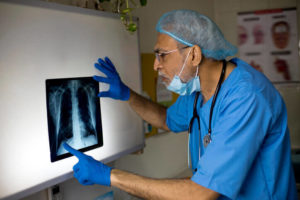Lung Cancer Causes
The most common cause of lung cancer is cigarette smoking. However, exposure to other toxins like asbestos can also lead to this cancer. If you developed lung cancer, you might qualify for financial aid and other benefits. Learn about the possible causes of lung cancer and how to get help.
Top Causes of Lung Cancer
Like all types of cancer, lung cancer can develop when healthy cells mutate and divide at out-of-control rates. There are many issues that can cause lung cancer to form.
- Smoking: Cigarette smoking is by far the biggest cause of lung cancer
- Asbestos exposure: Asbestos fibers can get trapped in the lungs and eventually cause cancer.
- Radon: Radon is an odorless gas that can harm the lungs if inhaled
- Secondhand smoke: Even if you didn’t smoke, you still could develop lung cancer through secondhand smoke.
- Other factors: A family history of lung cancer and exposure to other carcinogens (cancer-causing substances) are just a few other factors that can lead to lung cancer.
Lung cancer can be very dangerous and even life-threatening without proper medical care. Thankfully, there are treatments available no matter what caused your lung cancer. Financial aid might also be available as well. Learn more by getting a free case review now.
- Access Financial Aid and Justice
- Learn About Your Options
- Contact Us for Free

Common Causes of Lung Cancer
Smoking, asbestos, and radon are among the most notable causes of lung cancer. Learn about some of the most common reasons why people develop lung cancer below.
Asbestos Exposure
Asbestos is a naturally occurring group of minerals that is made of very tiny fibers. People can develop lung cancer 10-50 years after they are exposed to asbestos.
When someone is exposed to asbestos, they can inhale tiny fibers that get trapped in the lungs. The fibers can’t be destroyed or removed by the human body, and they irritate lung tissue for decades until genetic mutations set in.
Asbestos exposure is also known to cause other types of cancer, most notably mesothelioma (which often affects the lung lining).
Lung cancer caused by asbestos is very aggressive, but medical care and financial aid are available. Learn more: Call (877) 446-5767 now.
Smoking Cigarettes
Most cases of lung cancer are caused by smoking. In fact, over 80% of lung cancer deaths are linked to smoking, according to the American Cancer Society (ACS).
The ACS notes that cigarettes have at least 70 carcinogens in them. These chemicals damage the parts of DNA that prevent cancer and also make it harder for cells to fix DNA damage. Over time, the damage becomes irreparable, and the cells start to multiply at out-of-control rates.
People who are exposed to asbestos and use tobacco are even more likely to develop lung cancer than those who just smoked.
Radon Exposure
Radon is a radioactive gas that has no smell or color. Radon is found everywhere, but it is not dangerous unless it enters homes from cracks in walls, floors, and foundations.
Radon particles can get inhaled into the lungs, causing damage and eventually the formation of cancer tumors.
Radon is the leading cause of lung cancer among those who don’t smoke, according to the Environmental Protection Agency (EPA). It’s also the biggest cause of lung cancer behind smoking cigarettes.
First floors and basements usually have the highest radon levels since they are closest to the ground. Radon levels are typically higher in homes that are tightly sealed, well-insulated, and built on soil rich in thorium, uranium, and radium.
Exposure to Secondhand Smoke
Secondhand smoke is when you inhale another person’s smoke. The CDC notes there’s no safe amount of secondhand exposure — even being exposed briefly can be harmful.
There are two forms of secondhand smoke:
- Mainstream smoke is the smoke exhaled by a smoker.
- Sidestream smoke is smoke from the lighted end of a pipe, cigarette, tobacco burning in a hookah, or cigar. This type of smoke has higher concentrations of cancer-causing agents (carcinogens) and nicotine than mainstream smoke.
Over 7,300 people die from lung cancer caused by secondhand smoke per year, according to the American Lung Association (ALA).
Other Causes of Lung Cancer
The causes of lung cancer listed above are just a few of the many reasons why people get sick. View some of the other possible lung cancer causes and risk factors below.
Smoking Pipes or Cigars
Besides cigarettes, tobacco products like smoking pipes and cigars can also cause lung cancer.
Smoking pipes have many of the same carcinogens as cigarettes. As such, people who smoke pipes are more likely to develop lung cancer, as well as head, neck, and liver cancer, compared to nonsmokers.
“Cigar smoking and pipe smoking are almost as likely to cause lung cancer as cigarette smoking.”
— American Cancer Society
Cigars use fermented and aged tobacco, which contains known carcinogens like nitrites and nitrates. When lit, cigars produce even more carcinogens, including carbon monoxide, nitrosamine, ammonia, and tar.
Get a free case review for help after a lung cancer diagnosis now.
- Access Financial Aid and Justice
- Learn About Your Options
- Contact Us for Free



Family History of Lung Cancer
Family history and genetics may put some people at a greater risk of lung cancer.
For example, Johns Hopkins Medicine notes that someone is two times more likely to develop lung cancer if a family member already had it. The risks increase if someone has been exposed to other possible causes (like cigarette smoke or asbestos).
Further, the ACS notes that someone is more likely to develop lung cancer again if they already had it.
Exposure to Hazardous Chemicals
Exposure to hazardous chemicals like arsenic, asbestos, beryllium, nickel, cadmium, and certain petroleum products may also cause lung cancer by altering a person’s DNA.
Causes of Lung Cancer by Type
There are two main types of lung cancer: non-small cell lung cancer (NSCLC) and small cell lung cancer (SCLC).
Both types of lung cancer can be caused by any of the factors listed above. However, SCLC is most commonly seen in those who smoked, according to the ACS.
Metastatic Lung Cancer Causes
A person has metastatic lung cancer when the cancer spread to other parts of the body. This happens when lung cancer cells separate from a tumor and travel through lymph nodes or blood to other organs and tissues.
Metastatic lung cancer has the same causes as SCLC and NSCLC. However, no lung cancers are metastatic from the outset. If your doctor diagnoses you with metastatic lung cancer, you’ve had cancer for a long time already.
Metastasis (the process of spreading to other parts of the body) takes a little bit of time. However, you may not have any noticeable lung cancer symptoms until tumors are large enough to affect other tissues and organs.
Find Help for Lung Cancer


If you have lung cancer, they will match you with suitable treatment options, such as clinical trials, targeted therapy, and cancer care. Further, you may qualify for compensation depending on what caused your lung cancer.
Our team can help you recover compensation for:
- Basic living expenses such as groceries and rent
- Health care costs
- Lost wages
- Travel expenses if you need to travel for cancer care
Learn more by getting a free case review right now.
FAQs About Lung Cancer Causes
Does asbestos cause lung cancer?
Yes. Asbestos exposure has been known to cause lung cancer as well as mesothelioma, an aggressive cancer that can form in the lining of the lungs or other organs.
If you’ve been exposed to asbestos 10-50 years ago and aren’t feeling well, see a doctor immediately. It takes decades for illnesses to form after asbestos exposure, but once they set in, they can progress quickly without treatment.
You may be able to get help from medical professionals and lawyers if you have lung cancer caused by asbestos. Makers of asbestos-based products knew the dangers but did nothing, so it may be possible to hold them financially accountable through legal action.
What causes lung cancer in non-smokers?
Secondhand smoke, radon, a family history of lung cancer, and exposure to hazardous materials like asbestos can cause cancer in non-smokers.
This is why it’s important to get screened for lung cancer if you have symptoms. Even if you didn’t smoke, you could be at risk.
What causes cancer in women?
Lung cancer causes for women are generally the same as for men (smoking, secondhand smoke, and asbestos exposure).
The ACS projects that 3,000 more women will be diagnosed with lung cancer in 2023 than men. However, 7,200 more men are predicted to die from lung cancer than women.

